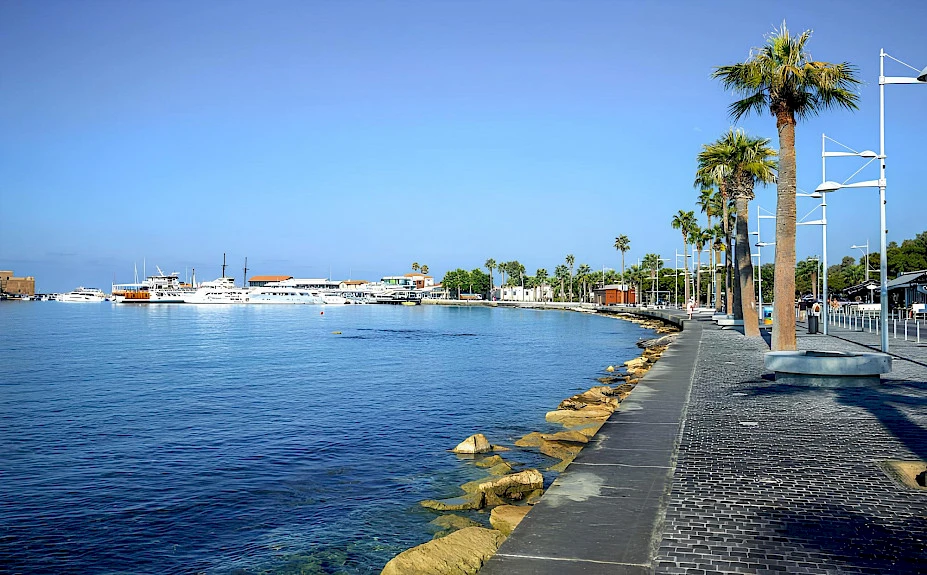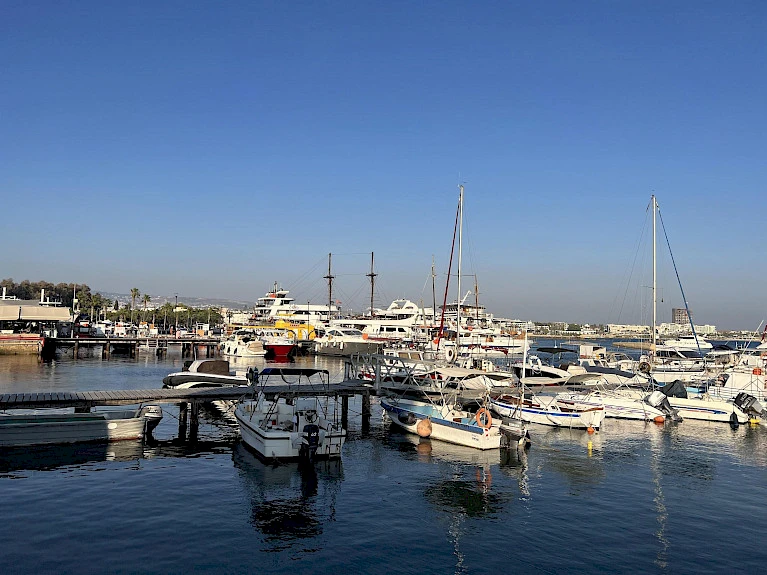Who should move to Paphos?
- Why People Choose Paphos for Living
- Who Will Benefit from Moving to Paphos
- Culture and History of Paphos
- Paphos – Cultural Capital of Europe
- Real Estate Market and Investments
- What to See in Paphos
- Best Beaches in Paphos
- Pros and Cons of Living in Paphos
- Conclusion
Why People Choose Paphos for Living
Paphos is not only the historical capital of ancient Cyprus but also a modern, comfortable city with a relaxed pace of life. The city is particularly popular among Russian-speaking expats who value tranquility, clean air, and proximity to the sea.

The climate here is mild and sunny most of the year, with low humidity and comfortable temperatures even in summer. The cost of living is lower than in Limassol or Nicosia: rent starts from €700, and property from €1700 per m². Infrastructure is compact: airport, clinics, schools, cafes, and shops are all nearby. About 38% of residents are expats, creating a friendly atmosphere. Paphos is ideal for families, remote work, and small businesses.
Who Will Benefit from Moving to Paphos
- Families with children — safe environment, Russian and English schools, quiet neighborhoods.
- Retirees and remote professionals — comfortable climate, healthcare, sea, and tranquility.
- Investors — favorable prices and stable rental returns. In 2024, Paphos was recognized as the best city in Cyprus for living.
Culture and History of Paphos
Paphos is divided into two parts: Kato Paphos — a tourist area by the sea with hotels, bars, and a promenade; and Pano Paphos (Ktima) — the business center with banks, schools, and restaurants. The harbor of Kato Paphos, included in the UNESCO list, is one of the best places for walks and experiencing the city’s history.

Paphos – Cultural Capital of Europe
In 2017, Paphos was named the Cultural Capital of Europe. This gave a strong boost to development: roads, facades, museums, public spaces, and the lighthouse (now a museum) were renovated. The city flourished and attracted new residents and tourists.
Real Estate Market and Investments
In 2025, the Paphos market continues to grow. Popular areas include Kato Paphos, Peyia, Tala, Chloraka, and the university district. Prices range from €1700 to €2200 per m², with rental yields of 5–6.5% per year. Deals with foreigners increased by 38%, with active buyers from the UK, Germany, and Russia.
What to See in Paphos
Paphos is rich in attractions: the archaeological park with ancient mosaics, Tombs of the Kings, Aphrodite’s Baths, and Paphos Castle. Museums — Byzantine, Ethnographic, and local traditions — reveal the island’s culture. In the evening, one can choose between Bar Street with clubs and bars or quiet restaurants on the promenade with sunset views.

Best Beaches in Paphos
- Coral Bay — sandy beach with infrastructure, ideal for children.
- Latsi — a peaceful spot with clear water, popular among divers.
- Geroskipou — awarded the “Blue Flag,” located near the village of Geroskipou.
- Lara — a wild beach on the Akamas Peninsula, known for its scenic views.
- Corallia — a beach 14 km from the city, in the Peyia area.
- St. George Beach — a small beach near Peyia, cozy and popular.
- Faros Beach — city beach near the lighthouse, also awarded the “Blue Flag.”
- Vrisoudia — 300-meter maintained beach in the city center, comfortable and clean.
Pros and Cons of Living in Paphos
Pros:
- Mild climate, clean sea, sun, and nature.
- Relaxed pace of life, ideal for families and retirees.
- Developed infrastructure: schools, healthcare, shops, cafes.
- Historical heritage — city under UNESCO protection.
- Favorable tax system for non-residents.
- Low crime rate and high safety.
Cons:
- Limited career opportunities outside tourism and service sectors.
- Many tourists and higher prices in summer.
- Nightlife is limited compared to Limassol.
- Weak public transport, a car is needed.
- Bureaucratic procedures when processing documents.
Conclusion
Paphos is a city for those who want to live by the sea without the hustle, with quality infrastructure, culture, and history. It is suitable for families, investors, remote work, and retirement. If you are considering Paphos for relocation — start with a consultation with specialists who will help choose a district, arrange a residence permit, and buy property. Paphos is open to new residents — all that remains is to take the first step.
